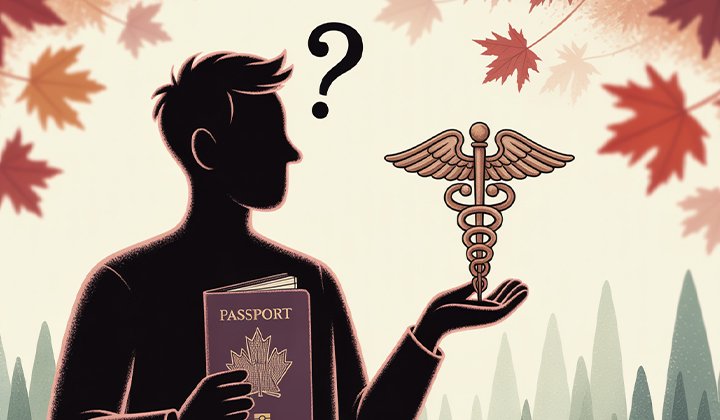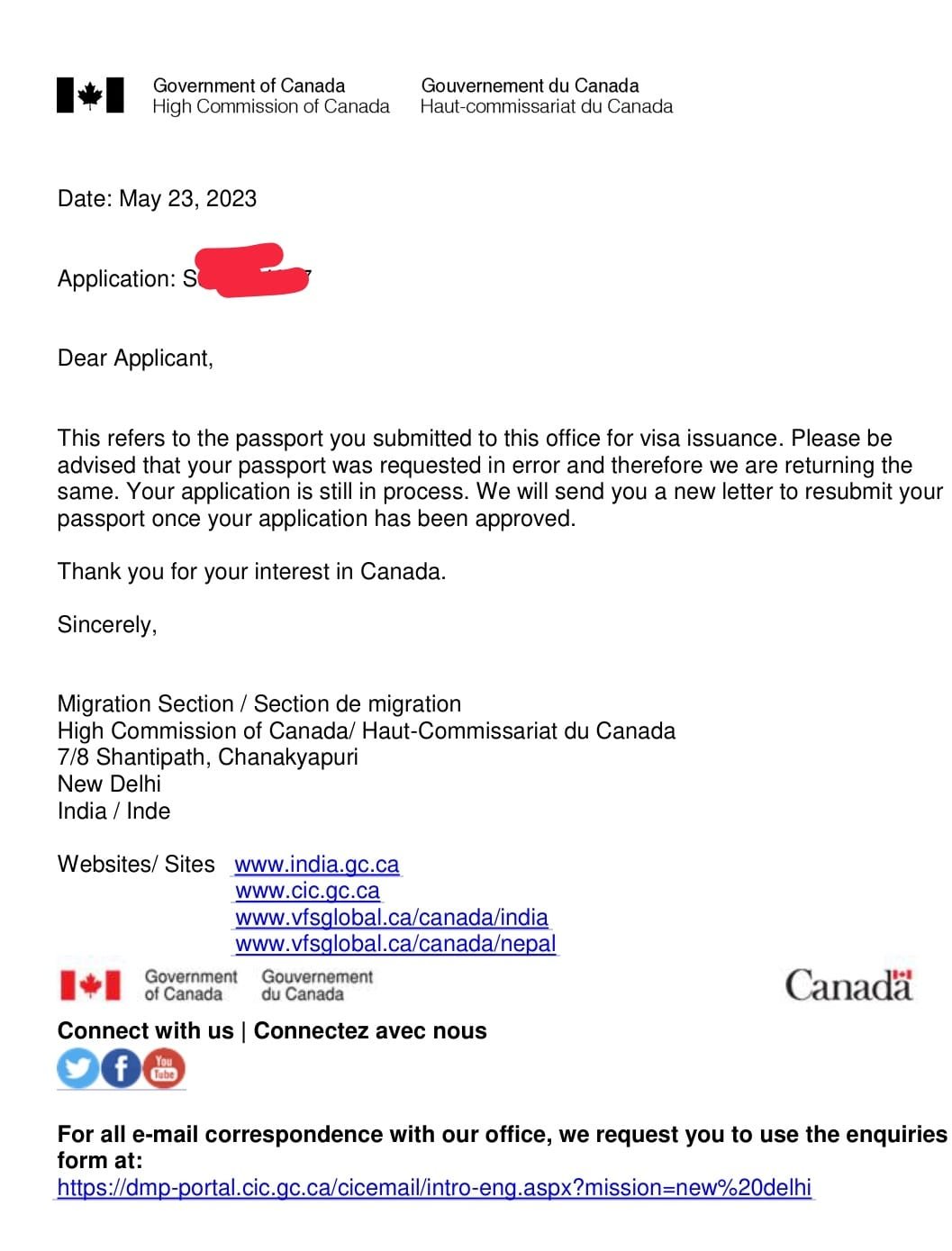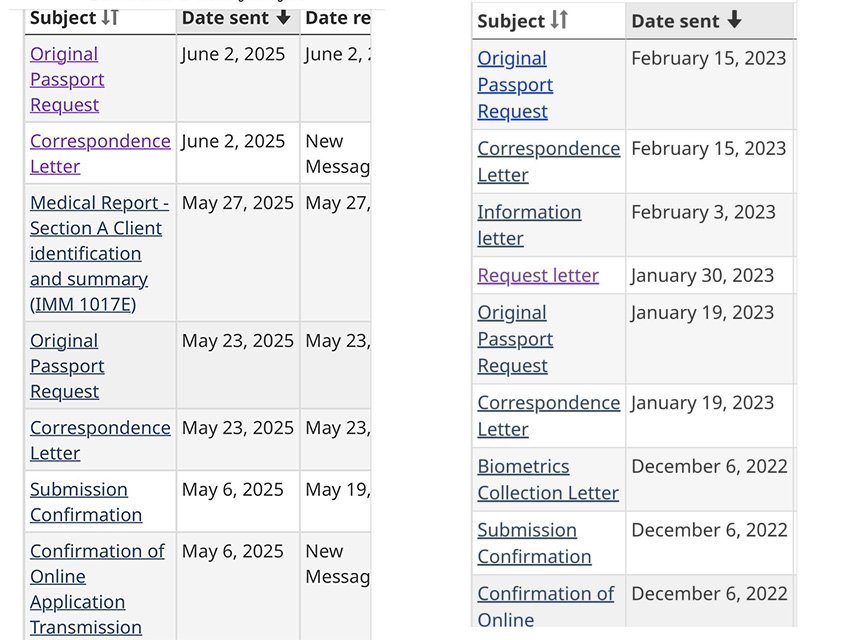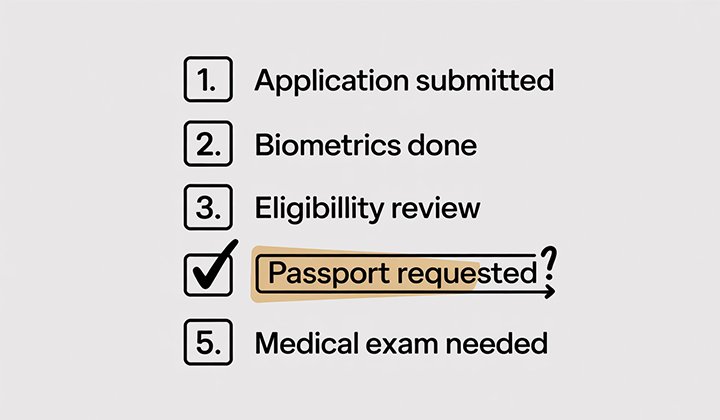You’ve meticulously prepared your Canadian visa application—perhaps for a study permit or a work permit. You’ve tracked its progress, and suddenly, a notification pops up: IRCC is requesting your passport! Excitement bubbles up, but then a wave of confusion hits. You haven’t even received a request for your medical examination yet, or maybe you just got it after the passport request.
This scenario, while not the standard operating procedure, does happen. As seen in real-life situations discussed on forums like Canadavisa and Quora, applicants can find themselves in this perplexing situation. So, what’s going on? Is it an error? And most importantly, what should you do?
Why Does IRCC Sometimes Request a Passport Before Medicals are Done?
The typical Canadian visa application process, especially for temporary resident visas (TRVs) like study and work permits, often follows a sequence:
application submission -> biometrics -> eligibility review -> medical request (if required) -> medical results -> final decision -> passport request (if approved).
When this sequence gets jumbled, here are the most likely reasons:
- Administrative Oversight or Human Error: Visa offices process thousands of applications. Sometimes, an officer might prematurely trigger a passport request, or there might be a simple clerical error in the sequence of actions taken on your file.
- System Glitches: IRCC’s processing systems are complex. Automated triggers or system errors can occasionally lead to requests being sent out of the standard order.
- Parallel Processing (with a Twist): Different aspects of your application might be reviewed by different officers or departments. It’s possible the officer assessing your overall eligibility and documentation is ready to move towards finalization (pending other checks), while the medical component is handled separately and might be slightly delayed or processed by a different stream that hasn’t caught up. In such cases, a “conditional” pre-approval might be forming, leading to an early PPR.
- “Pre-emptive” PPR: In some rare instances, particularly if your application is otherwise very strong and seems likely to be approved, an officer might issue a PPR anticipating that your medicals (which might have been requested around the same time or are about to be) will be clear. This is less common for TRVs but not impossible.

What Happens Next? The Crucial Role of the Medical Exam
Regardless of when you receive the passport request, one thing remains absolutely critical: your medical examination (if required for your application type and duration of stay) is a mandatory component for visa approval.
- Medical is Non-Negotiable: Even if IRCC has your passport, they will not stamp your visa until your medical examination is completed and you are deemed medically admissible to Canada.
- If You Haven’t Received a Medical Request Yet: If you got a PPR but no MR, one will likely follow shortly. Keep a close eye on your IRCC account and emails.
- If You Received a Medical Request After PPR: This is the common scenario from the forum threads. Your priority is to get the medical exam done ASAP.
- Passport on Hold: Your passport will likely be held by the Visa Application Centre (VAC) or the visa office. They will wait for the medical results to be submitted by the panel physician and reviewed by IRCC.
- Outcome Scenarios:
- Medicals Passed: Once IRCC receives and approves your medical results, they will proceed with stamping your visa in your passport and returning it to you.
- Medicals Failed or Further Tests Required: If your medical exam reveals an issue of inadmissibility, your visa application will likely be refused, even if they have your passport. If further tests are needed, the process will be delayed until those are completed and reviewed.
In most student visa and work visa applications, if the applicant receives a passport request before completing their medical exam, they often receive a correspondence titled “Information Letter” or “Error.” This letter typically states that the passport request was made in error and that the application is still under processing. It advises the applicant not to submit their passport at that stage. Later, the applicant will be instructed to complete the medical exam, followed by a final and valid passport request.
Below is Sample copy of letter from IRCC if PPR request was made in ERROR

Is this an IRCC error? And Should You Be Worried?
It’s more accurate to call this a procedural anomaly or an administrative hiccup rather than a critical error that dooms your application.

Not Necessarily a “Bad Sign”: An early PPR doesn’t automatically mean your application is in trouble. In fact, it can sometimes indicate that the rest of your application (eligibility, funds, purpose of visit) looks good, and they are just waiting on the final medical clearance.
The key is compliance: The most important thing is how you respond. Promptly completing your medical exam is crucial.
Your Action Plan: What to Do if This Happens to You
If you find yourself with a passport request before (or just after) your medical request, here’s what you should do:
- Don’t Panic: Take a deep breath. This is manageable.
- Prioritize the Medical Exam:
If you’ve received the Medical Request (even if it was after the PPR), book and complete your medical exam with an IRCC-approved panel physician immediately.
If you have the PPR but no MR yet, keep checking your account daily. Once it arrives, act fast. - Submit Your Passport (If Instructed): Follow the instructions in the passport request letter precisely. If they’ve asked for it, send it. Ensure you keep copies of the PPR letter and your passport submission tracking.
- Inform IRCC (Optional but Recommended): Once your medical exam is done, you can consider sending a webform to IRCC. Briefly explain the situation:
“I received a Passport Request on [Date] and submitted my passport on [Date]. I subsequently received a Medical Request on [Date] and completed my medical exam on [Date] with Dr. [Panel Physician’s Name] in [City].”
Attach proof of medical completion if you have it (e.g., the eMedical information sheet). This helps ensure all parts of your file are connected and shows your proactiveness. - Keep Meticulous Records: Save copies of all correspondence from IRCC (PPR letter, MR letter), proof of passport submission, and proof of medical exam completion.
Be Patient: processing times can be affected. Once medicals are submitted, IRCC needs time to review them. There might be a slight delay as they coordinate the medical results with your already-submitted passport.
A Word of Caution (and Reassurance)
While this situation is usually resolvable, it’s important to:
- Never Assume Approval: A PPR, even an early one, is not a guarantee of visa approval. The medical exam is a significant hurdle.
- Honesty is Key: Be truthful in your medical examination.
- This Happens to Many: You’re not alone. As the forum threads show, other applicants for student visas, work permits, and other TRVs have experienced this and successfully navigated it by completing their medicals promptly.
Conclusion: Stay Calm and Complete Your Medicals
Receiving a passport request from IRCC before your medicals are complete can be unsettling, but it’s usually a sign of an administrative quirk rather than a serious problem with your application. The golden rule is to prioritize and complete your medical examination as soon as IRCC requests it. By staying informed, acting promptly, and keeping good records, you can navigate this unusual turn of events and continue on your path to Canada.
Case Study: The Triple Passport Request Saga – When an Early Stamp Leads to Unexpected Hurdles
This real-life account, shared by a student applicant, underscores the complexities that can arise when IRCC’s processing steps deviate from the norm, particularly concerning Passport Requests (PPR) and Medical Examinations. Let’s call our student “Amit” for this case study.
Applicant Profile: Student Visa Applicant
Timeline of Events (Application 1):
- October 2022: Amit lodges his student visa application.
- November 9, 2022: Amit receives a Passport Request (PPR). Crucially, he has not yet received a Medical Request (MR).
- November 26, 2022: Amit submits his passport. It is stamped with the visa, and he receives his Port of Entry (POE) Letter.
- Initial Assumption: At this point, Amit likely believed his application was fully approved and finalized.
- Post-Stamping Realization & Action: Amit, realizing the medical exam was missed in the sequence, proactively informs IRCC about this “medical error” via a webform.
- December 20, 2022: IRCC issues a Medical Request.
- December 31, 2022: Amit completes his medical exam, and the results are updated in the system.
- January 6, 2023: Amit receives a second PPR.
- Amit’s Dilemma & Decision: Confused, and knowing his passport already has the valid visa stamp, Amit decides not to resubmit his passport for this second PPR.
- January 20, 2023: Amit’s application is refused. The stated reason: “Failure to submit passport on time” (in response to the second PPR).
Timeline of Events (Application 2 – Reapplication):
-
- January 25, 2023: Amit reapplies for the student visa.
- March 4, 2023: His new application begins review.
- March 10, 2023: Amit receives a third PPR (this time for the new application).
Amit’s Frustration: “My application get refused even I have stamps on my passport and I already get POE [from the first application].”
Analysis: What Went Wrong and Why?
This case is a perfect storm of an initial procedural anomaly by IRCC followed by a misunderstanding of how to handle subsequent automated requests.
- Initial IRCC Anomaly: The first major issue was IRCC issuing a PPR and subsequently stamping the visa before the mandatory medical examination was requested and cleared. This is a significant deviation from standard procedure. It suggests a visa officer may have pre-emptively approved the application based on other factors, or there was an administrative oversight in not triggering the medical request first.
- System Disconnect & Automated Processes:
- When Amit (rightfully) informed IRCC about the missing medical exam, this likely triggered a process to rectify the omission.
- Once the medicals were requested and completed, the IRCC system, or a different processing stream, likely identified that a “final step” (PPR for stamping) was needed after medicals were passed. The system may not have been sophisticated enough to recognize that this applicant’s passport had already been stamped due to the earlier anomaly.
- The second PPR on January 6th was likely an automated or standard request generated once medicals were marked as “passed” or “in progress,” without cross-referencing the prior stamping.
- Applicant’s Assumption & Critical Misstep: While Amit’s logic for not resubmitting his already-stamped passport is understandable from a practical standpoint, it was a critical error in terms of IRCC process compliance.
- IRCC requests are generally non-negotiable without explicit instruction otherwise. Even if a request seems redundant or erroneous, ignoring it carries a high risk of refusal for non-compliance.
- Communication Gap: Although Amit used a webform initially, when the second PPR arrived, the ideal step would have been to immediately contact IRCC again via webform, explaining:
- He received a second PPR.
- His passport was already stamped with a valid visa (perhaps even attaching a scan of the visa and POE).
- Politely asking for clarification on whether he still needed to submit his passport and how to proceed given the existing stamp.
What Could Happen Next with the Reapplication?
- For the reapplication (which resulted in the 3rd PPR), Amit must submit his passport as requested.
- Assuming his medicals from December 2022 are still valid (usually for 12 months) and all other aspects of his new application are in order, this reapplication has a good chance of approval.
- The previous refusal, while frustrating, was for a procedural issue (failure to submit passport for PPR2), not necessarily for ineligibility.
Key Lessons from Amit’s Experience:
- Comply First, Clarify Concurrently: If you receive any request from IRCC, even if it seems like an error or a repeat, the safest default is to comply. If you believe it’s an error, simultaneously use the webform to explain your situation and seek clarification, but still aim to meet the deadline for the request if possible, or ask for an extension while they review your query.
- Don’t Assume IRCC Knows Your Full History Intuitively: While IRCC has your file, different departments or automated systems might not always have a complete, real-time picture of unconventional sequences. A new request might be generated without full context of prior unusual actions.
- Proactive and Persistent Communication (with Evidence): When irregularities occur, communicate clearly and provide evidence (like scans of documents, previous correspondence). If a confusing request arrives (like PPR2), explain the full situation in a webform.
- The System Isn’t Perfect: This case shows that IRCC’s systems, like any large bureaucracy’s, can have glitches or lead to confusing outcomes when non-standard events occur.
- Reapplication is an Option: Even after a frustrating refusal due to procedural issues, reapplication is often possible if the underlying eligibility remains.
This case study, while specific to Amit, is a valuable lesson for any TRV applicant, especially students and workers, about the importance of meticulous compliance and proactive communication when faced with unusual IRCC requests.



